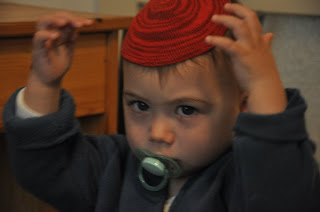Grandchildren are perhaps the greatest of comforts to bereaved parents. Grief for a child who has left this world never ends completely, but its pain is greatly softened, and even sometimes forgotten – this is true for me, at least – when we spend time with our children’s children. As I've written in my memoir:
"It’s as if a deep pit opened up inside me.... I’ll never be able to fill the hole, but what I can do is build my life around it, continually adding meaningful relationships, work, and creative pursuits, so that the pit becomes a proportionally smaller and smaller part of my being. It’s still there, but it’s dwarfed by its surroundings."
My grandchildren certainly dwarf that pit.
Daniel and I have many times had the good fortune to host our oldest daughter Elisheva and her partner Tayir for Shabbat together with their son Imri, who is now twenty-one months old (Elisheva is Imri’s biological mother, and Tayir is in the process of adopting him). Two weeks ago we were even luckier, when the couple took a two-day vacation alone (their first since Imri was born) and left him with us. Besides the great fun we had with him, we also got a bonus – the opportunity to witness his budding resilience.
When they visit, Imri normally runs into our home as soon as we open the door, shouting “Ka!” (his name for me) and “Abba!” (his name for Daniel). When they arrived that Friday, though, he refused to walk in. His mothers hadn’t said anything to him – at his age there would be no point, as he can’t yet grasp a concept like “two days” – but he could tell something was up. Eventually they carried him in. It took about an hour before he was willing to stop clinging to Elisheva or Tayir, and to come to us.
When he seemed ready, they waved to him and said, “Shalom, Imri. We’re going for a trip now, but we’ll be back.”
“Lom, Mma!” he replied, waving, and turned back to put another block on the tower he was building.
Imri’s mood remained excellent throughout the weekend. I took him to synagogue Shabbat morning, as I always do, and he played, looked at his books, and went up and down the aisle flirting with everyone in the women’s section, as he always does. At home, he played with us, ate happily, and talked and talked and talked.
The first time he asked for his mother was when I was putting him to sleep Friday night. I said, “Eema isn’t here, but Savta (Grandma) is here, Sabba (Grandpa) is here, Ayala is here, David is here,” and so on, naming everyone who was with us for that Shabbat, including his two-month-old cousin Arielle. “Eema will be back tomorrow.” He calmed down right away and fell asleep. He asked for “Mma” again only another couple of times, when he was tired or fell down, and each time we were able to calm him quickly.
Don’t get me wrong – he didn’t forget his mothers. On Sunday, we explained that Eema would be back later. A short time afterward, we were playing in the living room when David came out of his room.
“Who’s that coming?” I asked Imri.
Immediately a huge smile lit up his face. “Mma?” he asked hopefully.
“No, it’s David,” I said. “Eema will come later.”
He looked at me seriously for a second, then went back to the book he was leafing through.
For a while after his mothers returned he wouldn’t get off Elisheva’s lap, or stop hugging her. I came to sit down beside them, saying things like, “Your Eema’s back! That’s so great for you!” At first he looked out at me a bit suspiciously from the safety of the maternal lap. But after a few minutes, he suddenly gave me a big grin. “Ka!” he said lovingly. Then he looked at Elisheva and said, “Mma!” Then again at me, “Ka!”
When we took the three of them out to dinner that evening, he sat happily next to me, smiling from time to time and saying “Ka!” in that loving tone. I melted every time.
Clearly, he wasn’t holding a grudge – at least while his mothers were there. But the real proof of his forgiveness came the next day, when they were safely back at home in Tel Aviv. Elisheva phoned me for some advice, and suddenly I heard in the background, “Ka? Ka!”
“He recognizes your voice,” she told me.
“Even when you’re the one talking with me?”
“Yup. He knows telephone voices from across the room.” We finished our conversation and hung up.
About an hour later, the phone rang. It was Elisheva again. “He insists on speaking with you,” she said.
She put him on and we had our usual conversation.
“Hello, Imriki?”
“Yes.”
“Did you call me?”
“Yes.”
“Did you call me to give me a kiss?”
“Yes.”
“So give me a kiss.”
He made a loud kissing sound and gave the phone back to his Eema.
I’m floored by Imri’s ability to stay with us and feel almost no distress, and to go back afterward to his normal life, free of anger. To me, this demonstrates a resilience rooted in the deep basic trust that he's developed through the loving and patient mothering he’s gotten all his life from Elisheva and Tayir.
I believe that resilience is one of the most crucial qualities we can nurture in our children. I'm sure that Imri's will stand him in good stead, throughout what I hope will be a long and eventful life.

4 comments:
Always worth reading the things you write.
Thank you very much, little cat. :)
just found this, very cool
Same
Post a Comment